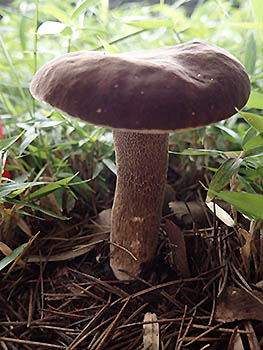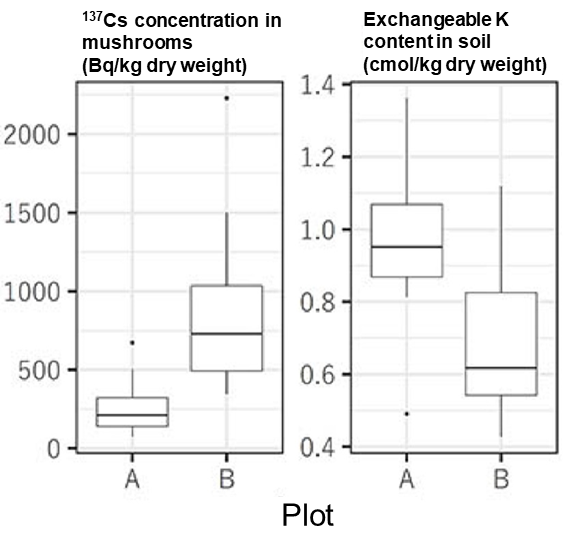Effects on Ecosystem
(2021)
QI heard the amount of cesium wild mushrooms absorb becomes smaller when the soil is rich in potassium. Is that true?
A An investigation was made on the concentrations of radioactive cesium in the fruit-bodies of Boletus hiratsukae and the chemical properties of the soils below for two survey sites with almost the same amount of radioactive cesium deposition, and a comparison was made between the survey sites.
As a result, it was found that the concentrations of radioactive cesium in the fruit-bodies were negatively correlated with the exchangeable potassium content in the soils below. This result indicates that cesium absorption of mushrooms is affected by the potassium content of the soil.
It is known for crops such as rice that applying potassium reduces the concentration of radioactive cesium in the plant bodies. This finding suggests the possibility of potassium being applicable to mushrooms as well for reducing the concentration of radioactive cesium.
Eastern Japan was widely affected by radioactive materials by the accident at the Fukushima Daiichi NPS that occurred in 2011. Many wild mushrooms are high in radioactive cesium concentration, and are restricted from shipping for consumption in 113 municipalities in 11 prefectures even as of August 2020. It has been known that radioactive cesium concentrations in wild mushrooms can vary several-fold even for the same species, but the reason why has yet to be identified. Some studies found that the concentrations of radioactive cesium in crops and trees were negatively correlated with the exchangeable potassium content in the soils below, and it is possible that the concentrations of radioactive cesium in the fruit-bodies (mushrooms) are also affected by the soil environment of the growing site, leading to the variations.

Picture: Fruit-body of Boletus hiratsukae that grew in a survey plot
To find that out, an investigation was made on the concentrations of radioactive cesium (137Cs) in the fruit-bodies of Boletus hiratsukae (picture) and the chemical properties of the soils below for two survey sites with almost the same amount of radioactive cesium deposition, and a comparison was made between the survey sites. As a result, it was found that the concentrations of radioactive cesium in the fruit-bodies were negatively correlated with the exchangeable potassium content in the soils below (Fig.). This result indicates that cesium absorption of mushrooms is affected by the potassium content of the soil.

Fig. Concentration of radioactive cesium (137Cs) in Boletus hiratsukae (Left) shown lower at a survey site with higher exchangeable potassium content in the surface soil (0-5 cm layer) (Right)
It is known for crops such as rice that applying potassium reduces the concentration of radioactive cesium in the plant bodies. This finding suggests the possibility of potassium being applicable to mushrooms as well for reducing the concentration of radioactive cesium.
(Research results from the Forestry and Forest Products Research Institute and others. Reproduced from the website of the Forestry and Forest Products Research Institute (partly edited by JAEA))
Related articles
- How have the radioactive Cs concentrations changed in wild animals in Fukushima prefecture?
- Are foods from Fukushima safe?
- I heard most of the forests would not be decontaminated. Does cesium remain in the forests?
- How do air dose rates in forests change with time?
- Is there a continuous input of cesium contamination to rivers from forests?
